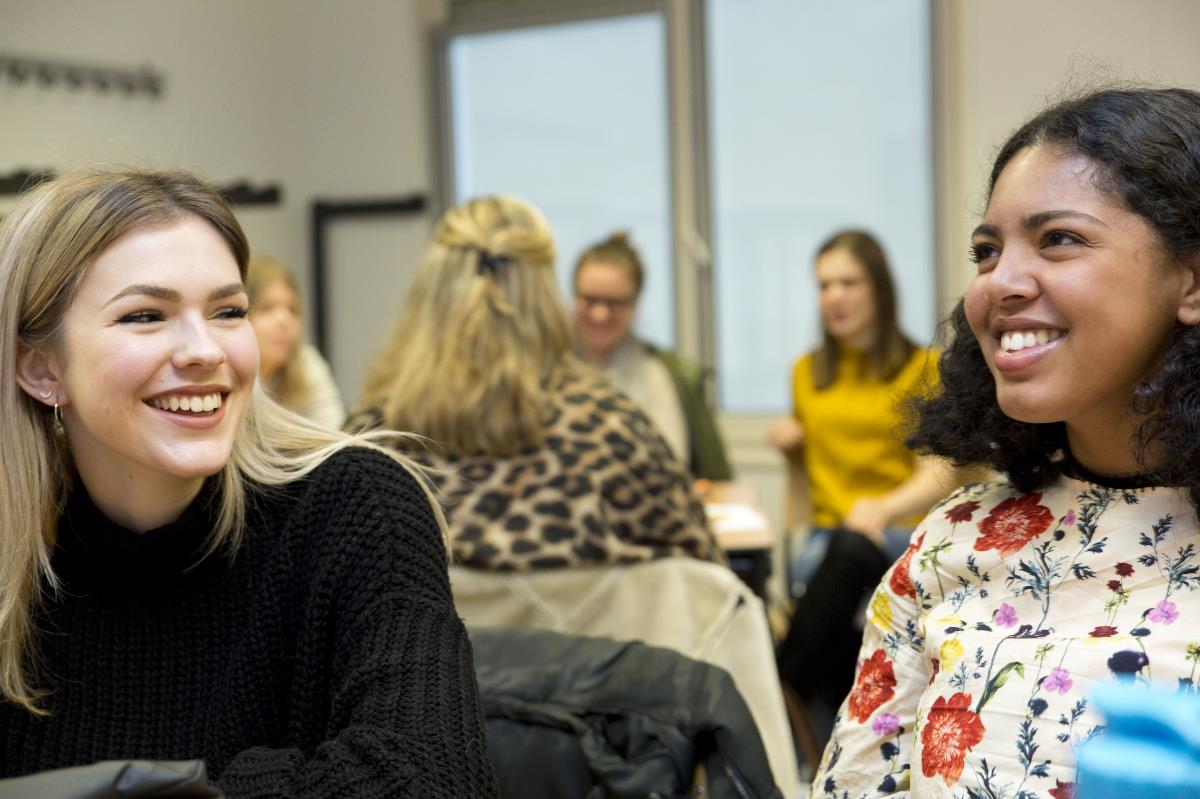Why Study IFMC
Imagine analysing the finances for a global company like Adidas, deciding where to open their next flagship store to ensure profitability, or helping a small start-up, like a local meal-kit delivery service, forecast expansion costs and secure funding for growth. Your job? Use your financial expertise to create budgets, assess risks, and recommend strategies. This is what IFMC is all about—solving real-world problems using numbers/ data / information and helping businesses thrive.
This three-year fast-tracked IFMC programme is not just a traditional finance degree; it’s a well-rounded programme that combines accounting, risk management, strategy, and decision-making. You’ll learn how to interpret financial data, identify business opportunities, and provide practical solutions. For example, you might help a small eco-friendly clothing brand figure out how to price their products to stay competitive while maintaining profits.
This degree prepares you to face today’s business challenges, such as managing a company’s cash flow during unpredictable times or creating financial strategies for launching a new product. By studying IFMC, you’ll gain the skills to not only understand complex problems but also to deliver solutions that businesses can use to thrive.
Real-World Work Experience
Our curriculum is designed with employability in mind. You’ll develop professional, interpersonal, and cross-cultural skills that are essential in today’s global workplace. Through collaborative group projects based on real-world cases, you’ll gain problem-solving, teamwork, and communication skills which you will be able to apply to any field of work.
At IFMC, we don’t just teach finance; we prepare you for a career from day one. A key part of this are the two internship periods, designed to give you a head start in the job market. During your internships, you’ll apply what you’ve learned to real-life business situations, gaining invaluable hands-on experience. Many students are offered part-time jobs by their internship companies after completing their placements.
By the time you graduate, you’ll have a portfolio of professional achievements, a global network of contacts, and the confidence to succeed in any business environment. Our graduates go on to work at some of the most prestigious organisations worldwide, including Goldman Sachs, ABN AMRO Bank, Boston Consulting Group, Deloitte, KPMG, BMW, NN Investment Partners, and Accenture.
Personal Approach
At IFMC, you’re not just a student—you’re part of a community. Our approachable lecturers are on first-name terms with students, and your classmates come from all over the world. You’ll collaborate with peers, build lifelong friendships, and grow in a supportive, inclusive environment where your voice matters.
Your personal and professional development is guided every step of the way. From your first year, you’ll be matched with a mentor who will support you as you set goals, navigate challenges, and build your confidence. Our open-door policy means you will have direct access to lecturers who are genuinely invested in your success.
Admission requirements
You have a Dutch diploma
| Vooropleiding | Vereiste profiel |
|---|---|
| Havo (senior general secondary education) | Does not qualify for admission |
| Vwo (pre-university education) |
|
| Mbo (senior secondary vocational education and training) | Does not qualify for admission |
International Financial Management and Control has a four-year and a three-year programme, the latter differing only in its duration and study intensity. To qualify for this three-year programme, you will need the equivalent of a higher level Dutch VWO diploma.
To be eligible for the three-year IFMC bachelor degree programme, you should have a VWO diploma with the appropriate profile.
This programme also offers a 4-year track
If you have an academic background comparable to the Dutch HAVO level, you might want to consider enrolling for the 4-year track of this degree programme instead. Check out this website for more information about the 4-year programme.
The admission procedure
If you meet our admission conditions, you’ll be invited to attend an interview. This interview will last 30-45 minutes and will be conducted in English. The aim of the interview is to assess if there is a match between you and the IFMC programme.
Language requirements
If you were not educated in the Netherlands you usually have to submit a language test to be admitted. Depending on the type and country of your diploma you may however qualify for exemption. Please check our entry requirements page for more information.
You have a non-Dutch diploma
To enrol for the IFMC 3 year programme you will need a secondary school diploma comparable to a Dutch VWO diploma and a good command of English.
Before we can decide on your eligibility, we’ll need to assess your secondary school certificate.
To make sure your certificate is evaluated fairly, we work with NUFFIC, an organisation that specialises in the assessment of international education qualifications.
Don’t meet the entry requirements?
Perhaps your academic background is not quite the right level. Or you need some help improving your English skills. Don’t worry. There might be some alternative options to help you get in, and prepare yourself for a successful start of your studies at The Hague University of Applied Sciences (THUAS).
21+ admissions test
If you’re 21 years old before 1 September 2022, but don’t have a diploma or a qualification that meets the entry requirements, you can take the 21+ Admissions Test. The 21+ Admissions Test is offered at several dates between January and the start of the academic year, and consists of a digital general capacity test. Please note that you can only participate if you have an EEA-nationality or residence permit for the Netherlands that is valid on the test date.
English Academic Preparation Programme
Need help with your English? If you haven’t quite reached the right level of English for your chosen Bachelor’s or Master’s degree programme, you can enrol for English Academic Preparation Programme. After the successful completion of this programme, you’ll be ready to start your degree at THUAS and you will already have a good taste of studying and living in the Hague.
The Hague Pathway College
If you’d like to apply for a 3-year bachelor programme but don’t meet the academic entry requirements, you might be interested in joining The Hague Pathway College. This foundation programme has two intakes, one in September and one in January. It offers you the chance to bring your academic level up to the required level and work on your English at an academic level at the same time.Please check www.thehaguepathway.nl for more information
Decisions regarding your qualification for admission
There are no exceptions to the official admission requirements. The Enrolment Office is the only party that can make decisions regarding your qualification for admission based on official regulations. You can’t rely on any other sources of information for your qualification for admission.
Degree programme in figures
Degree programme content
What will you study each year?
Working methods
At IFMC learning goes beyond the classroom. You’ll engage in lectures, seminars, study visits, self-study, group activities, and project work to develop a well-rounded skill set. Our lecturers coming from 3 different continents, bring international and professional expertise to your education. You’ll also benefit from guest speakers from leading global businesses who share real-world insights. By the time you graduate, you’ll have honed your communication, analytical, cultural, teamwork, and research skills—a practical advantage over traditional research university programmes.
Minors
Shape your degree
In the first semester of year two, you’ll have the opportunity to specialise with two minors. These options allow you to customise your education and gain the expertise to stand out in the job market.
Our minors cover a range of trending topics in finance and business, including blockchain technology, risk management, and data science. These programmes equip you with advanced knowledge and practical tools to tackle challenges like managing financial risks, analysing big data, or integrating sustainability into business strategies.
Additionally, we’ve partnered with Erasmus University Rotterdam to offer two mandatory pre-master minors that provide direct entry to their master’s degree programmes covering accounting, auditing, finance, and control. This means you can complete both your bachelor’s and master’s degrees in just four years, saving time and accelerating your career.
At work
Making an Impact
An IFMC graduate isn’t just ready for the job market—they’re prepared to make a difference. You’ll bring practical skills and a collaborative mindset to every role, whether it’s interpreting data, streamlining processes, or advising management.
Example: One graduate developed a predictive financial model for a multinational, reducing costs and improving forecasting accuracy.
95% of our graduates secure employment within three months of graduation, joining companies like Just Eat Takeaway, Karl Lagerfeld, Kraft Heinz, Coca-Cola, Basic-Fit and UBS Investment Bank. From Business Controller to Risk Analyst, IFMC alumni excel in diverse roles. Whether you choose to lead change in a small enterprise or innovate in a global corporation, IFMC equips you with the skills and mindset to succeed.
Career Perspectives
An IFMC degree opens the door to exciting career paths:
- Business Controller
- Financial Analyst
- Auditor
- Financial Controller
- Risk Analyst/Underwriter
- Investment Advisor
- Financial Consultant
- Risk Manager
- Group Treasurer
- Sustainable and Impact Investing Analyst
- Cash Manager
- Finance Manager
- Business Analyst
Testimonials from our students
Who better to tell about the degree programme than our own students? They share their experiences here. Some of them are also ready and waiting to answer any questions you may have.
Career perspective
An IFMC degree opens the door to exciting career paths:
Business controller
Financial Analyst
Auditor
Financial Controller
Risk Analyst/Underwriter
Investment Advisor
Financial Consultant
Risk Manager
Group Treasurer
Sustainable and Impact Investing Analyst
Cash Manager
Finance Manager
Business Analyst
At work
Next steps
You’ll be ready to make your mark in the professional world - not just accounting. You’ll impact the day-to-day business of an organisation - interpreting numbers, giving sound advice on management and process improvement and implementing your dashboard building skills. But we also work as team players on a level playing field, valuing each other’s opinions.
Continue studying
For students aspiring to become certified accountants or advance in specialised financial roles, a master’s degree is essential. With IFMC’s mandatory pre-master minors, you can fast-track your journey by securing direct access to prestigious master’s programmes at Erasmus University Rotterdam. These master’s programmes in accounting, auditing, finance and control prepare you for high-level positions, such as CFO or senior financial consultant, equipping you with the expertise and qualifications to achieve your professional ambitions.
Practical information
What else do you need to know?
How to apply
Your enrolment request must be submitted through Studielink. Before you do, please check the official name of the programme below. Would you like to find out more about the application process first? Check our page How to apply . The key deadlines are listed here as well. This degree programme starts in September and there is no intake in February.
Tuition fee
You will have to pay tuition fees when you enrol on a bachelor's programme. You can pay in one or more instalments. If you pay in more than one instalment a small administration fee is charged.
More information about tuition fees
Scholarships
Find out more about scholarships for international students. Please note that these scholarships are one-off scholarships only, meaning that if you obtain them it is only for your first year of study.
Student finance
Dutch students qualify for extra financial support via a loan. Dutch students automatically qualify for this financial assistance and international students may be eligible if they have lived in the Netherlands for at least five years or are employed for at least 56 hours per month.
Additional Costs
You must also budget for books, excursions and field trips. You can expect to pay approximately €800 per year to cover these additional costs. During your semester abroad, you will also need to pay for tickets, housing and insurance.
Visa and residence permit
Hulp bij studiekeuze
Wat als je nog twijfelt?
Het kan zijn dat je helemaal enthousiast wordt over deze opleiding International Financial Management & Control. Het kan ook zijn dat je nog twijfelt en nog vragen hebt. Ook na je bezoek aan een Open Dag, na meelopen en/of na het praten met studenten, docenten, ouders en decanen. Wij helpen je graag om de juiste opleiding te kiezen.
- Twijfel je tussen meerdere opleidingen? Neem dan contact op met een van onze studiekeuzeadviseurs voor een persoonlijk gesprek of meld je aan voor een studiekeuzeworkshop.
- Twijfel je specifiek over deze opleiding? Neem dan contact op met iemand van de opleiding voor al je opleidingsgerelateerde vragen. Dat kan via de Contactbutton rechtsboven op deze opleidingspagina.
Assistance during your studies
Study coaching and advice
We assume your time at IFMC will run smoothly. However, we do offer personal assistance if you are experiencing any problems. You’ll be allocated a mentor who can help you keep track of your progress. They can help you improve your time management skills, or find the right people within the programme to answer more complicated questions. They’ll also support you if you have any personal problems that can impact your study. For more information about student counsellors/student psychologists, high-performance sports, Dutch language support or studying with a functional disability, go to our page about support during your studies.
Official details of the programme
This degree programme is registered in Registration of Institutions and Programmes (RIO):
- Official Dutch name of degree programme: Finance & Control
- Official international name: Finance & Control
- Programme code (Isat): 35520
- Institution code (Brin): 27UM
Both the official Dutch and the official international name of the degree programme (current at the time of your graduation) will be printed on your diploma.
For more information on the accreditation of this degree programme, see the Accreditation Organisation of the Netherlands and Flanders (NVAO) website.
Binding Study Advice (BSA)
To continue your degree programme after the first year, you need to earn 50 of the 60 credits (ECTS). Some degree programmes also set other requirements to pass onto the second year of the course. This could, for example, be a specific subject that you must pass and that counts towards the 50 credits. We call this a qualitative requirement. If you meet the credit requirements as well as the qualitative requirement where applicable, you will receive a positive binding study advice (BSA) from the Examination Board at the end of your first year.
If you earn less than 50 credits and do not meet the qualitative requirements where applicable, you will receive a binding negative study advice and will have to leave the degree programme. This is why this advice is called a Binding Negative Study Advice (NBSA).
Your academic progress may be affected by personal circumstances such as illness or the professional practice of a sport. It is important that you inform the Examination Board immediately of any personal circumstances that might apply to you. The Board can take these into account when issuing its study advice.
Read all the rules for the binding study advice in Chapter 7 of the Programme- and Examination Regulations (PER) for your degree programme.
Looking for a different degree programme?
You might find these programmes interesting too!





